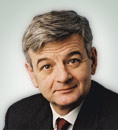Europe’s Blast from the Past
BERLIN – If there is one historical episode that still makes most Europeans shiver, even after a century, it is the outbreak of World War I, the seminal European catastrophe, which began in the last days of July 1914. In fact, exactly one hundred years later, after two World Wars and a Cold War, those shivers are more pronounced than ever.
In view of Europe’s bloody history, the states that established today’s European Union opted for non-violence, the inviolability of borders, democracy, and the rule of law. They chose cooperation, even integration, instead of military confrontation, and economic development rather than power politics. But this “EU Europe” is now being thrown back in time and challenged, yet again, by the return of power politics on its borders and in its immediate vicinity.
In the East, President Vladimir Putin’s Kremlin wants to change national borders by force and thus secure Russia’s reemergence as an imperial world power. Meanwhile, chaos and violence – most pronounced in Syria, Iraq, and Gaza – threaten to engulf the entire Middle East, challenging the territorial integrity of states that are largely a result of the World War I peace settlement.
Peaceful, postmodern Europe will find it difficult to cope with the challenges that the revival of power politics implies. The EU has more than doubled in size since 1989, when communism in Central and Eastern Europe collapsed; but EU Europe has not reached its final, politically integrated form. More important, it was not designed to meet the challenges of power politics; Europe’s old nation-states are too small and weak, while the EU’s common foreign and security policy remains insufficiently developed.
Yet many Europeans believe that the EU and the West must not simply give free rein to Putin’s rogue behavior. There is too much at stake in eastern Ukraine – the peace and order of the entire continent. The mostly European passengers of Malaysia Airlines Flight 17, downed over rebel-controlled territory, paid for this insight with their lives.
The timing of historically significant events usually is not a matter of choice. So the fundamental question in the aftermath of such events always concerns how quickly their consequences are correctly identified. It took an exceedingly long time for Europe’s leaders to realize that all of the trust they had placed in Putin, and the tolerance they showed for his politics of violence and intimidation, has led only to further escalation and expansion of the crisis in Ukraine. Indeed, only after almost 300 civilians died aboard MH-17 was the EU prepared to impose the sort of economic sanctions that will have a meaningful impact on the Russian economy.
In terms of the further development of a common European foreign and security policy, the significance of these common EU sanctions, adopted last week, should not be underestimated. After the EU finally masters the first step (effective sanctions), the second step – an “energy union” that enables Europe to end its dependence on Russian energy supplies – must follow as soon as possible.
With regard to the Middle East, the challenges to Europe’s capacity for collective action will be even more difficult to overcome. This reflects the presence within the EU of strong pro-Israeli and pro-Palestinian camps, which usually block each other; moreover, the conflicts currently playing out in the Middle East are much more complex than that in eastern Ukraine.
The countries currently most affected by the region’s turmoil – Iraq, Syria, Lebanon, Israel/Palestine, Egypt, and Libya – are likely to be joined soon by Jordan, Yemen, and the Gulf states. And the crisis is compounded by Iran’s nuclear program and the competition – fueled by sectarian conflict – between Shia Iran and Sunni Saudi Arabia for regional supremacy. A solution (or solutions) to the Middle East’s travails is nowhere in sight.
Today, only one outcome can be predicted with a high degree of confidence: further escalation of conflict, which will threaten to throw the entire region into chaos, leading to further violence and greater risk of contagion. There is, for example, a real danger that parts of the Middle East conflict will be exported to neighboring Europe. Whether the EU likes it or not, it will have to face these conflicts, because decisions about its internal and external security are likely to be made in the Middle East as much as they are in Brussels and national capitals.
Europeans are living in a neighborhood that has become increasingly uncertain – a development that calls for the sort of strategic responses that no single European state can provide by itself. Further deepening of EU integration and reinvigoration of the common foreign and security policy dialogue are thus the order of the day.
Unfortunately, a century after modern power politics unleashed a war that killed more than ten million of their forebears, many EU Europeans remain reluctant to prepare for the gathering storm. One must hope that this changes sooner rather than later: preparing is always better than shivering.
Copyright: Project Syndicate/Institute for Human Sciences, 2014.
www.project-syndicate.org
This article is brought to you by Project Syndicate that is a not for profit organization.
Project Syndicate brings original, engaging, and thought-provoking commentaries by esteemed leaders and thinkers from around the world to readers everywhere. By offering incisive perspectives on our changing world from those who are shaping its economics, politics, science, and culture, Project Syndicate has created an unrivalled venue for informed public debate. Please see: www.project-syndicate.org.
Should you want to support Project Syndicate you can do it by using the PayPal icon below. Your donation is paid to Project Syndicate in full after PayPal has deducted its transaction fee. Facts & Arts neither receives information about your donation nor a commission.





















